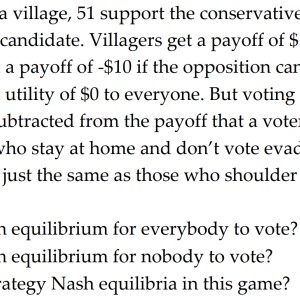Game theory 100 voters
a. Why is it not a Nash equilibrium for everybody to vote?
b. Why is it not a Nash equilibrium for nobody to vote?
c. Find all the pure strategy Nash equilibria in this game?
 Bruhmoment
Bruhmoment
Answer
If everybody votes, then the liberals have a payoff of $-11\$ $, so they can stay home and get $-10\$ $ instead, improving their payoff. Thus this is not a Nash equilibrium.
If no one votes, then everyone has a payoff of $0\$ $. But then if any person goes to vote, they improve their payoff to $9\$ $, so again this is not a Nash equilibrium.
In fact, no Nash equilibrium in pure strategies exists. Suppose there is one. If the outcome is a tie, then since the villagers are split $51/49$, there must be someone who didn't vote (and thus gets a $0\$ $ payoff). If they go vote instead, their candidate wins and they improve their payoff to $9\$ $, so this can't be a Nash equilibrium.
Suppose a candidate wins. If the opposing candidate got at least one vote, then whoever voted for the losing party gets $-11\$ $. If they instead don't vote, they get $-10\$ $, so this is not a Nash equilibrium either.
Finally, suppose a candidate wins, and no one voted for the opposing candidate. If the winning side got at least two votes, then either of the voters could improve their payoff from $9\$ $ to $10\$ $ by not voting, so this again is not a Nash equilibrium. If the winning side got a single vote, then any villager of the opposing party could go vote and improve their payoff from $-10\$ $ to $-1\$ $, so this can't be a Nash equilibrium either.
The list is exhaustive and so no pure strategy Nash equilibrium exists.
-
Thank you for the clear answer
- answered
- 3966 views
- $5.00
Related Questions
- Two players alternately remove nodes from a connected graph G
- Bayesian Nash Equilibrium
- There is always a player such that every other player was either beaten by him or beaten by a player beaten by him
- IRS Game Theory Question
- Game Theory Question
- Game theory questions
- Rotational symmertries of octahedron, $R(O_3)$
- Operational research : queueing theory

